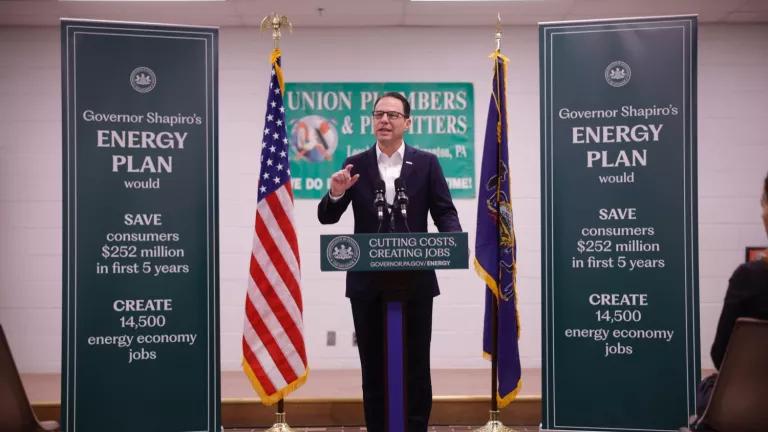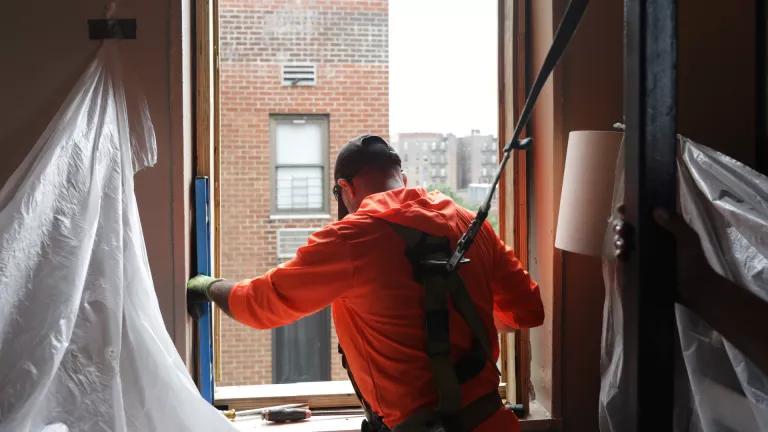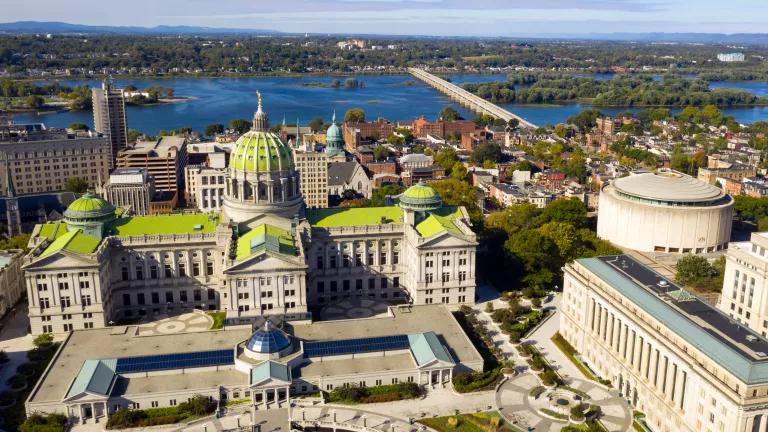SB 119/HB 637 Is a Dead End. PA Needs Good Climate Policy.
Pennsylvania lawmakers could advance good policy for Pennsylvanians by embracing RGGI—along with complementary clean energy and economic policies—rather than engaging in harmful climate denial and political posturing.

Update, March 23, 2022: SB 119 was passed by the Senate by a vote of 35-15 on June 14, 2021 and has been scheduled for a March 28 vote in the House Environmental Resources and Energy (ERE) Committee. HB 637 was reported from the House ERE in June, 2021 and amended in the House Appropriations Committee on February 9, 2022; it now bears the Orwellian title of "Energy Sustainability and Investment Act." The same amendment added by HB 637 is expected to be added to SB 119 on March 28th. NRDC's blog about the amendment is forthcoming.
Pennsylvania Senate Bill 119 and its House counterpart, House Bill 637, bear the Orwellian title, "the Pennsylvania Carbon Dioxide Cap and Trade Authorization Act." In fact, the purpose of the legislation is to strip the state Department of Environmental Protection (DEP) of its current legal authority to regulate climate-warming carbon dioxide, with the immediate goal of blocking the DEP from finalizing its proposed regulation to limit carbon pollution from the power sector and enable Pennsylvania to participate in the Regional Greenhouse Gas Initiative (RGGI).
This blog explains what SB 119/ HB 637 would do, why Republicans in the House and Senate are moving the legislation despite the certainty of a veto if it reaches Governor Wolf's desk, and how the bills' sponsors could advance good policy for Pennsylvanians by embracing RGGI—along with complementary clean energy and economic policies—rather than engaging in harmful climate denial and political posturing.
What SB 119/HB 637 Would Do
The legislation does three main things:
- First, it "finds" (wrongly) that the DEP lacks authority to regulate carbon pollution from the power sector, and includes as additional "findings" two legal arguments against the DEP's proposed regulation: that a cap-and-invest regulation would impose a tax on carbon (as this blog about DEP's legal authority explains, it would impose a carbon fee), and that RGGI is an interstate compact. (It's not).
- Second, the legislation prohibits the DEP from adopting a carbon dioxide regulation "unless the General Assembly specifically authorizes such a measure or action" through legislation in addition to SB 119/HB 637.
- Third, SB 119/HB 637 establishes an onerous process for the DEP to follow in developing a carbon dioxide regulation if, someday, the General Assembly authorizes such a regulation.
SB 119/HB 637 Is a Prequel, not a Policy
SB 119/HB 637 says that the DEP lacks authority to regulate carbon dioxide. Then it prohibits the DEP from regulating carbon dioxide. As a matter of logic, that makes no sense: if the DEP doesn't have the authority, there's no need to take it away. But the point of the legislation is not to make coherent policy. It's to try to block RGGI while at the same time sowing the ground for a judicial challenge if the legislation isn't enacted.
In a letter sent to Governor Wolf in April Senate Republicans intimated that if SB 119/HB 637 is not enacted, they will indeed sue the DEP to try to block the RGGI regulation. My blog on HB 2025 last year outlined the arguments that lawsuit is likely to raise; I won't repeat them here, just note that the letter's message: the Republicans will reject any Wolf nominee for the two seats currently open on the Public Utility Commission (PUC) unless Wolf stops the DEP's RGGI rulemaking.
This is an extraordinary ultimatum. On the one hand, the DEP's RGGI rulemaking has absolutely nothing to do with whether a nominee to the PUC has the qualifications to be an effective commissioner. On the other, the Senate has a constitutional duty to vet PUC nominations responsibly. (Article IV, Section 8 of the state constitution doesn't explicitly state that nominees should be evaluated on their merits, but there's no reasonable argument to the contrary). And the PUC is an extremely important state agency: it regulates electric, gas, water, and telecommunication utilities in Pennsylvania and determines (among other things) how much Pennsylvanians pay for their utility services. If the Senate keeps two out of five commissioner seats vacant, the PUC will be a much weaker regulator. Effectively, the message to the Governor is, "you can do something about climate change (though we'll still sue you over that) or you can protect Pennsylvania consumers, but you can't do both." This is hostage-taking. We've been here before.
Scoring Points v. Serving Pennsylvanians
Most of SB 119/HB 637 is dedicated to outlining a new, convoluted process for the DEP to follow in developing a carbon limits regulation. This proposal is not serious for two reasons. First, it would apply only if the General Assembly passes additional legislation authorizing carbon dioxide regulation, after enacting SB 119/HB 637. Second, it ignores Pennsylvania's existing convoluted process for developing DEP regulations under the Regulatory Review Act and other statutes. That process already features a prominent role for the General Assembly, as well as roles for the Environmental Quality Board, the Independent Regulatory Review Commission, and the Attorney General.
But again, the point of SB 119/HB 637 is not to make policy; it's to block climate action in Pennsylvania and score political points against Governor Wolf and the DEP. The bill seeks to do that by requiring the DEP to itemize every possible cost of RGGI while largely ignoring its benefits. This one-sided approach seeks to mask the pollution reductions, job creation, and economic development that RGGI has driven. As I discussed in a blog last September, the program’s benefits to consumers have far exceeded its costs, with consumers saving over a billion dollars on their energy bills as a result of RGGI-funded investments in energy efficiency and clean renewable energy.
Some of the sponsors of SB 119 and HB 637 represent districts with coal-fired power plants. They are right to be concerned about the impact of a carbon-limits regulation on those plants, because as I discussed here, carbon limits would likely hasten the closure of Pennsylvania's remaining coal plants.
The problem is that those plants are likely to close very soon even in RGGI's absence, because Pennsylvania's many new, efficient gas-fired power plants are out-competing the old coal plants. While SB 119 and HB 637's sponsors may not want to admit it (because of their allegiance to gas), gas is killing coal in Pennsylvania. The chart below shows the average "capacity factor" (a measure of how often a power plant runs, and a good proxy for how profitable it is) of Pennsylvania's coal plants over the last decade, and where capacity factors are likely to go in the next decade without RGGI. It's not a pretty picture.

Rather than wasting time on bills like SB 119/HB 637, the General Assembly should take actions that will actually help the workers and communities affected by the closure of coal plants. With the climate crisis worsening, it also must act to cut carbon pollution from power plants. It could do both if legislators embraced RGGI and were to use some of the program's auction proceeds to support coal workers and economic development in communities, while also investing in communities of color and low-income communities. Last year's SB 15 would do just that. (Note: an updated version of SB 15 is expected to be introduced in the Senate soon; last year's version has already been re-introduced in the House as HB 989).
There's an enormous amount of smart and creative thinking happening about how Pennsylvania (and other Appalachian states) can transition from an extractive fossil fuel-based economy to a more equitable and regenerative clean energy economy—from the Reimagine Appalachia campaign, to the effort for a Marshall Plan for Middle America led by Pittsburgh Mayor Bill Peduto, to the illuminating research of the Ohio River Valley Institute. We need a lot more of that thinking in Harrisburg.



